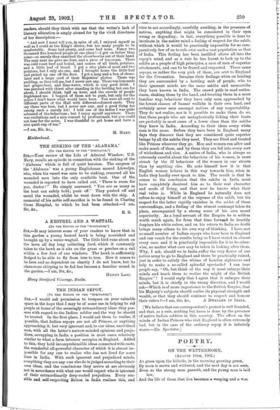THE INDIAN SEPOY.
[To THE EDITOR Or THE "SPICTITOR.1 Sts,—I would ask permission to trespass on your valuable space in the hope that I may be of some use in helping to rid people at home of the seemingly extraordinary ideas they pos- sess with regard to the Indian soldier and the way he should be treated. In the first place, I would ask them to realise, if possible, that Indian sepoys are not all Princes, or anything approaching it, but very ignorant and, to our ideas, uncivilised men, with all the latter's narrow-minded opinions and preju- dices, occupying in India a position in most cases relatively similar to what a farm labourer occupies in England. Added to this, they hold incomprehensible ideas connected with caste, the wonderful all-powerful character of which it is almost im- possible for any one to realise who has not lived for some time in India. With such ignorant and prejudiced minds, everything they see any one else do is judged according to their own ideas, and the conclusions they arrive at are obviously not in accordance with what one would expect who is ignorant of their extraordinarily deep-rooted prejudices. Every sen- sible and self-respecting Briton in India realises this, and tries to act accordingly, carefully avoiding, in the presence of natives, anything that might be considered in their eyes wrong or degrading ; in fact, everything possible is done to inculcate in the native mind a feeling of respect for the sahib, without which it would be practically impossible for so com- paratively few of us to rule over such a vast population as that of India. This feeling has been instilled above all into the sepoy's mind, and as a rule he has learnt to look up to the sahibs as a people of high principles, a race of men of superior attainments, and one to be feared and respected. These same sepoys, or rather the very pick of them, are sent to England for the Coronation. Imagine their feelings when on landing they are surrounded by a howling mob of people, who to their ignorant minds are the same sahibs and memsahibs they have known in India. The crowd yells in mad euthu- siaam, shaking them by the hand, and treating them in a most familiar way, behaviour they have only seen approached by the lowest classes of bazaar wallahs in their own land, and certainly never seen amongst natives of any respectability. They do not realise, nor is it possible to make them do so, that these people who are metaphorically licking their boots are probably in most cases of a lower class than the sahibs they knew in India. According to their ideas every white man is the same. Before they have been in England many days they discover that they are considered quite superior beings by all the sahibs they meet. They are feted and treated like Princes wherever they go. Men and women run after and make much of them, and by them they are led into every sort of wickedness and vice. A native of India, who is always so extremely careful about the behaviour of his women, is more struck by the ill behaviour of the women in our streets than by anything else. He asks himself how it is that English women behave in this way towards him, when in India they hardly ever speak to him. The result is that he comes to the conclusion that the sahibs in India must have completely deceived him as to their real character and mode of living, and that now he knows what their real value is. While in England he naturally does not refuse to enjoy himself at the expense of the sahib, but his respect for the latter rapidly vanishes in the midst of these surroundings, and a feeling of the utmost contempt takes its place, accompanied by a strong sense of his own moral superiority. As a loyal servant of the Empire he is seldom worth much again, for from that time forward he heartily despises his white rulers, and on his return to India no doubt brings many others to his own way of thinking. I have met no small number of Indian sepoys who have been in England and can vouch for the results being as I have stated in almost every case, and it is practically impossible for it to be other- wise, no matter what care may be taken in looking after them. Why, I ask, should we in India suffer the very flower of our native army to go to England and there be practically ruined, just in order to satisfy the whims of London sightseers and help to make a so-called splendid spectacle ? I can hear people say, " Oh, but think of the way it must enlarge their minds and teach them to realise the might of the British Empire" ! I would reply that I agree that it enlarges their minds, but it is chiefly in the wrong direction, and I would ask—Which is of more importance to the British Empire, that his Majesty's subjects should realise its physical strength and wealth, or that they should continue to respect and honour
[We believe that our correspondent's protest is well founded, and that, as a rule, nothing but harm is done by the presence of native Indian soldiers in this country. The effect on the minds of Indian Princes who visit England is often extremely bad, but in the case of the ordinary sepoy it is infinitely worse.—ED. Spectator.]






































 Previous page
Previous page